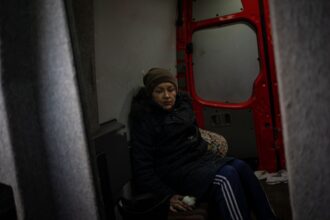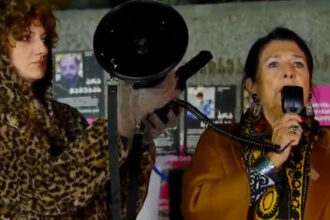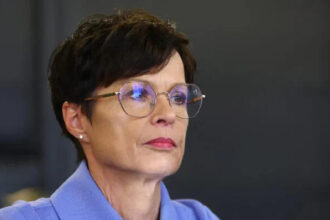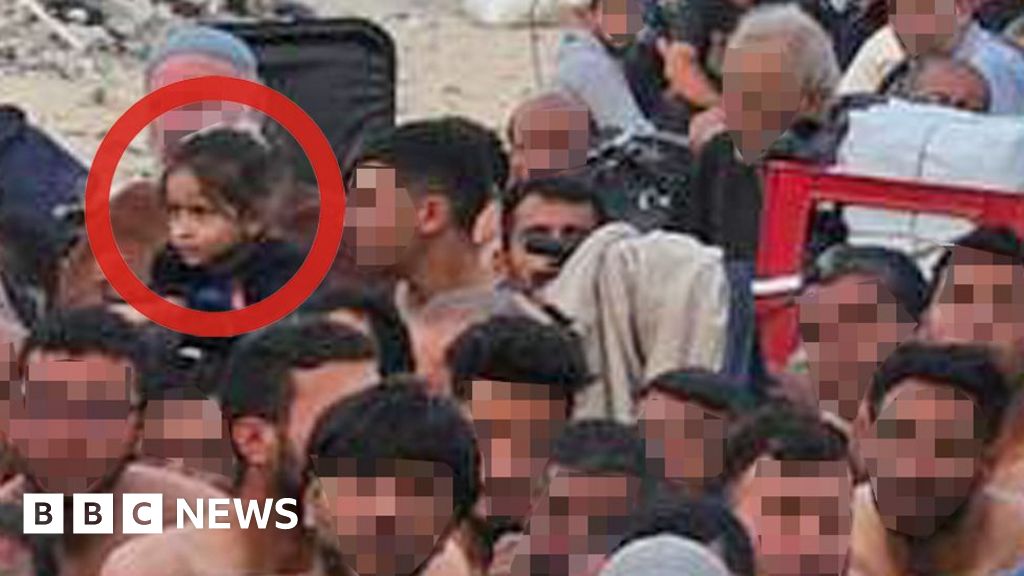It’s difficult to see her among the men. She is the tiny figure at the back. The soldiers have ordered that the men strip down to their underwear. Even some elderly men. They stare up at the person taking the photo. The image was first published on Telegram by a journalist who had strong sources within the Israel Defence Forces. The men look frightened, exhausted and abject. A BBC producer noticed the little girl in the photo. She is looking away. Perhaps something outside of the view of the camera caught her eye. She may not want to see the soldiers with their guns. The military has told the people to stop. Behind them, bomb-blasted buildings stretch into the distance. They are checking men for weapons, documents and any indication that they may be linked to Hamas. So often, the suffering of war is found in individual lives. The child’s appearance, her expression, as she looks away from you, is a detail which raises so many questions. First, who was she exactly? What happened to her? The photo was taken about a week before. A week that saw hundreds of people killed, thousands injured, and thousands displaced from their homes. Children died in the rubble from air strikes, or because there was no medicine or medical staff available to treat them. We began searching for this child with BBC Arabic Gaza Today. Israel does not permit the BBC or any other international media to access Gaza to report independently. The BBC relies on a network of trusted freelance journalists. Our colleagues showed the photo to their contacts in the north and in places where the displaced fled. Within 48 hours, word came back. The message read: “We found her!” Julia Abu Warda, age three, was still alive. Our journalist found Julia with her father and grandfather in Gaza City, where many Jabalia refugees have fled. She was watching an animated cartoon of singing chickens, but it was difficult to hear due to the ominous whine from an Israeli drone above. Julia was surprised that a stranger suddenly focused on her. “Who are you?” “Who are you?” asked her father, in a playful manner. “Jooliaa”, she replied, stretching out the word to emphasize.Julia had not been physically injured. Her hair was in buns, held in place by floral bands in bright blue. She was dressed in a jumper with jeans. Mohammed then began to tell her the story behind the photo. In the last 21-days, the family has been displaced five times. Each time, they had to flee from gunfire and air strikes. On the day of the photo, they heard an Israeli drone broadcasting an evacuation warning. This was in Al-Khalufa, where the IDF advanced against Hamas. “There was random gunfire. We walked towards the centre of the Jabalia Refugee Camp, on the road leading to the checkpoint. At first, everyone was together. Julia’s father, her mother Amal and her 15-month old brother Hamza were all there. Also, a grandfather, 2 uncles, a cousin and two aunts. But in the chaos Mohammed and Julia got separated. “I got split up from her mother because of the crowd and the things we were carrying.” Mohammed said, “She was able to go and I stayed put.” Father and daughter eventually moved along with the flow of people leaving. The streets were filled with death. Mohammed said, “We saw destruction on the ground and bodies scattered.” It was impossible to prevent Julia from seeing some of the destruction. The children are familiar with the images of violent deaths after more than a war year. The group reached an Israeli checkpoint. They approached people and began firing above their heads. During the shooting, people were pushing each other. The IDF uses this procedure to search for suicide bombers or concealed weapons. Mohammed claims that they were held for six to seven hours at the checkpoint. In the photo Julia appears calm. Her father remembered her distress afterward. “She started screaming and said she wanted her mom.” The family was reunited. The displaced are crammed into small spaces. Family bonds are strong. When kin from Jabalia arrive in Gaza City, the word spreads quickly. Julia was comforted and supported by those who loved her. The sweets and potato chip were a treat that was stored. Mohammed then revealed to our colleague that Julia had experienced a deep trauma before the day of their flight to Gaza City from Jabalia. She had a favorite cousin. Yahya was his name and he was 7 years old. They used to play in the street. Yahya, who was on the street about two weeks ago, was struck by a drone attack by the Israelis. The child was killed. “Life used to be a normal thing.” He said, “She would run and play.” Unicef, the United Nations Children’s Agency, reports that 14,000 children have died in the war. Jonathan Crickx, Unicef’s spokesman said: “Day after day, children pay the price for a conflict they did not cause.” Most of the children he met had lost a loved in terrible circumstances. The UN estimates that almost all Gaza Strip children – about one million – need mental health care. You can’t help but feel for her when you consider what she has been through and lost, and where she is stuck. Who knows what memories and dreams will return to her in the days to come. She knows that life can end suddenly. Her family will do everything they can to protect her, even if it means facing air strikes, gun battles and hunger.
Read More @ www.bbc.com




